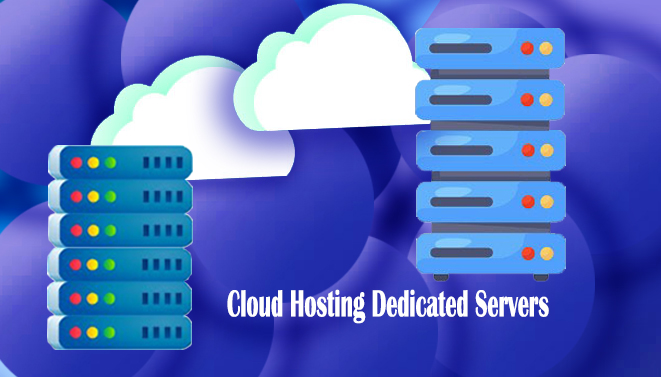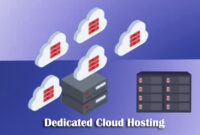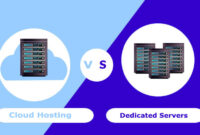Maximizing Performance and Security with Cloud Hosting Dedicated Servers
In today’s digital landscape, businesses are increasingly reliant on robust hosting solutions to ensure their online presence remains stable, secure, and scalable. Among the myriad options available, cloud hosting dedicated servers stand out as a powerful choice for enterprises seeking enhanced performance and reliability. This article delves into the benefits and considerations of opting for a cloud hosting dedicated server solution, highlighting why it might be the ideal fit for your business needs.
Understanding Cloud Hosting Dedicated Servers
Cloud hosting dedicated servers combine the advantages of dedicated hardware with the flexibility and scalability of cloud computing. Unlike traditional dedicated servers housed in on-premises data centers, cloud hosting leverages virtualization technology to deliver resources on-demand from a pool of physical servers. This setup ensures high availability, fault tolerance, and the ability to easily scale resources up or down based on traffic spikes or evolving business requirements.
Key Advantages of Cloud Hosting Dedicated Servers
- Performance Excellence: Dedicated resources mean your applications and websites operate on hardware exclusively reserved for your use. This translates to faster load times, smoother performance, and the ability to handle high traffic volumes without slowdowns.
- Enhanced Security: With dedicated servers, security risks associated with shared hosting environments are mitigated. You have full control over security configurations, firewall settings, and access permissions, reducing the likelihood of data breaches or unauthorized access.
- Scalability: Cloud hosting allows for seamless scalability. As your business grows, you can easily upgrade resources such as CPU, RAM, and storage without downtime, ensuring your infrastructure keeps pace with your needs.
- Reliability and Uptime: Built-in redundancy and failover mechanisms ensure high availability. Even if one physical server experiences issues, your applications remain accessible through other nodes in the cloud network, minimizing downtime.
- Cost Efficiency: While dedicated servers traditionally require substantial upfront investments, cloud hosting models often offer pay-as-you-go pricing. This means you pay only for the resources you consume, optimizing cost-efficiency while maintaining performance.
Considerations Before Choosing a Cloud Hosting Dedicated Server
While the advantages are compelling, it’s essential to assess your specific business requirements and technical considerations before migrating to a cloud hosting dedicated server:
- Technical Expertise: Managing a dedicated server, even in the cloud, requires technical expertise. Consider whether your team has the skills necessary to configure, monitor, and maintain the server infrastructure.
- Budget: Evaluate the total cost of ownership, including initial setup costs, ongoing maintenance, and scalability expenses. While cloud hosting can be cost-effective in the long run, upfront costs might vary depending on your chosen provider and configuration.
- Compliance and Regulations: Depending on your industry, you may need to comply with specific data protection regulations. Ensure your chosen cloud provider adheres to relevant standards and offers compliance certifications if required.
- Performance Requirements: Assess your application’s performance needs, including processing power, storage speed, and network bandwidth. Tailor your server specifications accordingly to meet these demands effectively.
Choosing the Right Cloud Hosting Provider
Selecting the right cloud hosting provider is crucial to maximizing the benefits of a dedicated server environment. Consider the following factors when evaluating potential providers:
- Reputation and Reliability: Research the provider’s reputation within the industry. Look for customer reviews, uptime guarantees, and service-level agreements (SLAs) that ensure reliability and support.
- Scalability and Flexibility: Ensure the provider offers flexible scalability options to accommodate your business growth. The ability to quickly adjust resources as needed is essential for maintaining optimal performance.
- Security Measures: Verify the provider’s security protocols, including data encryption, network monitoring, and intrusion detection systems. Robust security measures are non-negotiable when handling sensitive data.
- Support and Customer Service: Evaluate the provider’s support offerings, including available support channels, response times, and expertise levels. Prompt and knowledgeable support can make a significant difference during critical incidents.
Implementing Your Cloud Hosting Dedicated Server
Once you’ve selected a provider and configured your cloud hosting dedicated server, take proactive steps to optimize its performance and security:
- Regular Monitoring and Maintenance: Implement monitoring tools to track server performance, resource utilization, and potential security threats. Schedule regular maintenance tasks such as software updates and security patches.
- Backup and Disaster Recovery: Establish a robust backup strategy to protect against data loss. Ensure backups are stored securely and regularly tested for reliability. Implement a disaster recovery plan to minimize downtime in case of unforeseen incidents.
- Optimization and Tuning: Fine-tune server configurations based on performance metrics and workload demands. Adjust resource allocations as needed to achieve optimal efficiency and cost-effectiveness.
Conclusion
Cloud hosting dedicated servers represent a powerful solution for businesses looking to enhance performance, scalability, and security in their digital operations. By combining the dedicated hardware advantages with the flexibility of cloud computing, these servers provide a compelling alternative to traditional hosting models. However, success hinges on choosing the right provider, understanding your technical requirements, and implementing best practices for monitoring, maintenance, and security.
Whether you’re launching a new application, migrating existing services, or preparing for business growth, investing in a cloud hosting dedicated server can position your organization for sustained success in an increasingly competitive digital landscape. Evaluate your options carefully, prioritize performance and security, and leverage the scalability of cloud technology to propel your business forward.




